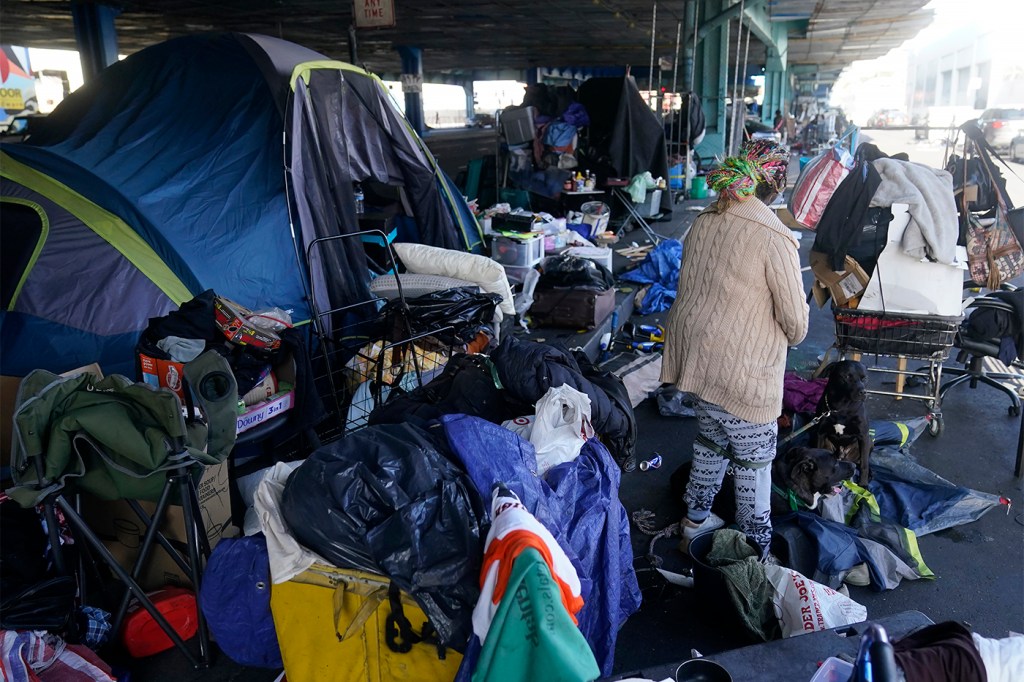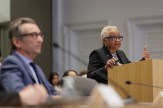Are bans on homeless encampments,
sleeping outside ‘cruel and unusual’? Policy experts discuss Supreme Court case
As rates of homelessness outstrip shelter accommodations nationwide, experts say that punitive measures will only compound the problem.

The Supreme Court this week weighed in on whether local ordinances in a southwest Oregon city that essentially prohibit homeless people from sleeping in public violate the Eighth Amendment’s ban on cruel and unusual punishment. Specifically, the laws fine those who are homeless from using “blankets, pillows or cardboard boxes” as protection while sleeping within the city limits.
“It was an interesting hearing that covered a lot of ground,” says Jeremy R. Paul, professor at the Northeastern University School of Law. “But if every town is allowed to make it impossible to be homeless or unhoused, many will be incentivized to do just that.”
Indeed, Northeastern public policy experts warn that such bans are a step in the wrong direction, especially at the backing of the high court. As rates of homelessness outstrip shelter accommodations nationwide — a direct result of the broader housing and cost-of-living crises — the experts emphasized that punitive measures will only compound the problem.
From trauma-informed solutions to human-centered designs, better thinking on the topic is critical, they say.
“Are there policy designs that can actually help everyone or as many people as possible, not just one singular group?” says Kim Lucas, professor of the practice in public policy and economic justice. “As we think about human-centered design, we have to think about the needs and wants of different constituencies — we have to consider the public good, especially in cases that focus on shared and public spaces like our parks and streets.”
Some courts have endorsed the view that homeless encampments amount, or contribute to, a “public nuisance,” such as in Arizona. For Lucas, the public nuisance argument recalls how discussions of urban “blight” have historically been used to justify, for example, razing different parts of a city to clear away “nuisance” infrastructure.
The real-world effect, Lucas says, has been the clearing out of “different people that the vocal few may not like to see — historically, people who may be living in poverty and people who are of immigrant and BIPOC communities.”
“We’ve said that blight exists as a ‘nuisance,’ and I can see how we may be using similar arguments around encampments,” Lucas says.
Featured Posts
In the U.S., those experiencing homelessness are disproportionately people of color, according to the Department of Housing and Urban Development.
“The way I conceive of this more broadly as it has been elevated to the Supreme Court is this is really about how they feel about seeing poverty,” Lucas says. “And if that’s the problem — seeing poverty, seeing people struggling — is the solution really to fine them away?”
Lucas says, “We don’t often talk about the values that underlie the policies we craft.”
One of the challenges confronting policymakers about the homelessness crisis is that it prompts “reactive” solutions. The complex nature of the problem requires coordinating across all levels of government — and “we’re terrible at coordinating,” Lucas says.
As a result, policymakers need to “start small,” she says; identify the groups that we are “ready to provide cross-sector support to” such as families, or veterans. Having worked as the director of civic research under former Boston Mayor Marty Walsh, Lucas says the city had focused primarily on reaching unhoused veterans — an effort that “really was about finding each individual,” and addressing their individual needs.
“When you create social policy for human beings, the goal is to support people where they are,” Lucas says.
Lucas continues: “I focus a lot on preventive policy, so a lot of the work that I do attempts to support people before they’re in dire straights; at the point in time where our policies are reactive to issues that have already happened, such as figuring out how to support individuals who no longer have a roof over their heads, these policies become even more complex, time-consuming, and costly — and rightly so because at that point we really need to tailor our support to a group of individuals whose needs may differ quite drastically from one another.”
We don’t often talk about the values that underlie the policies we craft.
Kim Lucas, Northeastern professor of practice in public policy and economic justice.
Emily Mann, teaching professor of human services at Northeastern, and senior research associate at the Dukakis Center for Urban and Regional Policy, says that prevention science, or looking at the root causes of homelessness, is critical to finding solutions. Today, that means understanding what researchers refer to as the social determinants of health, or the different aspects of a person’s environment that factor into their life trajectory in terms of health, quality-of-life and other associated risks.
“That means we’re looking to solve problems before they start, intervene early when problems start to manifest, and then treat and react to them once they’ve become a social problem,” Mann says.
When it comes to complex social problems, Mann says that single solutions — like fining or arresting those who sleep in public — are often counterproductive. She cites problems associated with the enforcement of fines in homeless communities, and the barriers that an arrest record can pose to finding housing and employment.
“And we know that policing people is expensive,” Mann says. “The policing and the criminal response to homelessness is problematic not only because I don’t think it’s cost-effective, but I also don’t think it’s effective in addressing the humanitarian aspect as well.”
The Supreme Court heard arguments Monday and is expected to rule on the case by the end of June. However the Supreme Court decides in City of Grants Pass, Oregon v. Johnson, Paul says that the homelessness crisis increasingly calls for a greater level of national policy involvement.
“The underlying policy issue is not going to go away,” he says.











